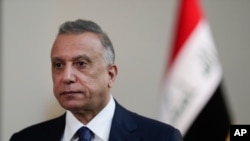U.S. President Joe Biden hosts Iraqi Prime Minister Mustafa al-Kadhimi at the White House Monday, with the future of U.S. troops in Iraq expected to be a focus of their discussion.
Iraqi Foreign Minister Fuad Hussein told VOA’s Kurdish Service last week he expected the two sides to agree on an end to the U.S. combat mission in Iraq.
The United States has about 2,500 troops in Iraq as part of the U.S.-led coalition effort to battle the Islamic State group that began in 2014.
The two countries agreed in April to change the American troops’ mission, focusing on training and advisory roles assisting Iraqi security forces, but there was no timeline for completing the transition.
Iraq declared victory against the Islamic State militants in 2017. However, the group has maintained a presence in the region, including carrying out a suicide bombing at a market in Iraq last week that killed at least 30 people.
“The goal is the enduring defeat of ISIS,” a senior Biden administration official told reporters using an acronym for the militant group. “We recognize you have to keep pressure on these networks as they seek to reconstitute, but the role for U.S. forces and coalition forces can very much recede deep into the background where we are training, advising, sharing intelligence, helping with logistics.”
Monday’s meeting also comes amid continued attacks against U.S. military positions in Iraq that the United States blames on Iran-linked militias. On July 24, a pro-Iranian militia commander issued a statement threatening to attack U.S. forces inside the country and calling for withdrawal of troops. A drone attack Saturday hit a military base in Iraqi Kurdistan that hosts American troops.
The presence of U.S. troops is a polarizing subject in Iraq, with some citing the need for U.S. military support for Iraq’s security forces and others, including Iran-linked political factions, calling for the American troops to leave.
In addition to the military, Biden and al-Kadhimi are also expected to discuss topics looking at future cooperation on political, economic, health, education and cultural matters.







